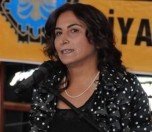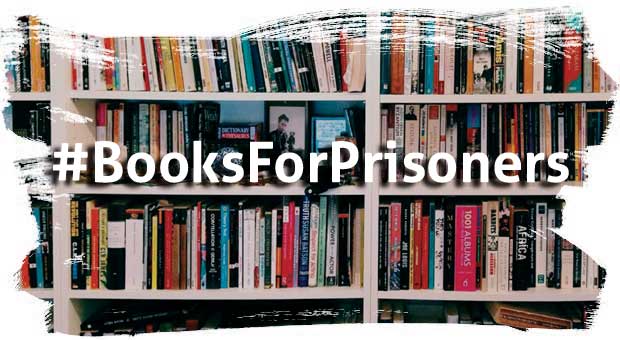Academic Büşra Ersanlı has written a letter to Peoples' Democratic Party (HDP) arrested Deputy Co-Chair Aysel Tuğluk following the racist attack on the funeral ceremony of her mother Hatun Tuğluk on September 14.
Dear Aysel, I have written to you months ago, I hope you received that correspondence. Foremost I want to offer you my sincere condolences. May your mother rest in heavenly light. She was spared from witnessing this horrific disgrace. She was spared from seeing the terrible pain you have endured. And even though that may be a weak consolation, perhaps we can console ourselves with that thought for one second. Ever since I learned this disgraceful attack, my mind has been filled with thoughts of you and your mother, and of me and my mother. On my first night in prison (five years ago), on the first night I spent in that cell and found myself alone with my thoughts, I felt some joy and relief that my mother had died before I had been imprisoned. She suffered from dementia the last eight years of her life, and in the later stages even had difficulty recognizing me. She, who would smile broadly when she did recognize me, would never have been able to comprehend such events. And I would have suffered greatly to have been separated from her. It was with such a strange relief that I finally fell asleep that first night. Your mother, even though ill, had visited you in that prison and had endured that kind of pain each time, and then she became too ill to visit and you were not allowed to be with her. It is because they have tried and failed to find a terrorist in you that they force you to wait. A hostage for a hostage; there is no other explanation. When your mother died, they gave you permission to attend her funeral. But there were those who chose to destroy that funeral, who attacked the funeral with hateful slogans, and forced your mother's body to be exhumed. And this, even though your mother had willed that Ankara cemetery to be her final resting spot. How you have managed to endure such pain defies my comprehension. After all that, burying her in Dersim was a right decision, but you were not given permission to travel there to attend the funeral. This is an act for which there can never be compensation. This is a maddening grief, one that surpasses normal reason. Using this kind of deep grief to destroy a person's – your -- mental state was done deliberately, and these efforts to shatter your patience were carried out with the kind of hate and ignorance that belie words, with an unspeakable lack of religious faith, and a desire to savage. This was the kind of attack carried out not by individuals we can recognize as persons, but one of a gang mentality, a robot-like gang driven by a lack of understanding of any living thing, from soil to plant. Perhaps their actions are greeted with applause, perhaps they are proud of what they have wrought, perhaps they were not truly aware of their actions. All this while the other side tries its hardest to give justice to the idea of what being human means... Frequently men tend to choose one-way track rationalizations. They look for a single, overriding reason on which to base such unconscionable behavior, but such behavior is actually provoked by a multitude of long-standing historic reasons. These provocations are being additionally buffered by technology, and – unfortunately – are not sourced from a single place, a single ethnic group, or a single culture, but rather from the ambition of brutal governments or the ignorant single-mindedness of those who long for such a state. The danger lies in reconciling ourselves to such. We have to cling to our sense of shock and do all we can to sustain humanity. And those who of us who refuse to accept such a state must continue to reveal those who do. I am sick and tired of thinking rationally. This hate has continued seemingly interminably. It's been going on now for a hundred, or maybe even two hundred years, goaded ever on by technology (the media). Just last week we remembered the events of 6 – 7 September. I was still very young then but I witnessed our neighbors' (Greek and Armenian) fears and anxieties. And even if we understand this kind of behavior, we continued to be baffled. We cannot let this kind of murderous propaganda gain legitimacy. Since that night my thoughts have only been about you and your mother. You should not have had to experience such a leave-taking and such a funeral ceremony. Everyone experiences silent private farewell to loved ones; they should not have made you experience it like this. I have been thinking about this since yesterday: You need to write again, Aysel. You need to explain what all this entails to those who have not experienced such. As you know only too well, private is political. And you write so beautifully, used to write so beautifully, and we used to derive a great deal of pleasure from reading your words. We are living in such a time that you should share with us all those emotions you have been experiencing. This may be the only way to sustain humanity. I think your sharing of your emotions will be one way to dry up that source of hatred. Please don't allow yourself to be overtaken by your grief. Your mother, Hatun, would have wanted you to remain sound and strong. Perhaps you are very strong right now. I am only writing this because I feel the damage caused by the explosion of so much accumulated hatred. Those holding cells, those waiting rooms, give witness to outbursts of helplessness, to manifestations of crises spurred by greed. Of course, one day those cells in which we wait will be transformed into cells in which they will wait. The laws and justice derived by humanity will one day find their rightful places. My grandmother had a sister named Seher. Her hair went white when she was only forty years old. Like her sister, she was also a seamstress. Before she died, and during her period of sickness, we used to call her frequently and visit her once a week. She lived in Ümraniye. When I would ask her how she was, she would answer 'my spirit is still residing inside me.' I was young and thought her response was strange and didn't understand what she was trying to convey. I was at my mother's side when she died and it was then that I saw with my own eyes how her spirit moved out of her. But the more I have faced injustice and the more I have lost, I have come to realize that simply having the spirit still residing inside us is just not enough. Your loss of your mother is also a loss for me and I share this pain by the way I know how, by writing. We have often repeated the phrase that we are all Alevi, all Kurds, and all Armenians. But those words are no longer satisfactory enough for me. As people, we have to interconnect our bodies, our brains, and our consciences and use them to further the advancement of individuals who live with honor. I am also tired of talking about "us." I only want to address you as 'you.' I wish you patience, and embrace and kiss you, as do all of our friends, our intimates, and our comrades. Büşra Ersanlı |
Translated by Nancy Rinke Öztürk (Sept 16,th 2017)
About Aysel Tuğluk
Born in Elazığ in 1965, Aysel Tuğluk worked as a lawyer. She served together with Kurdish politician Ahmet Türkas as co-chairs at the Democratic Society Party (DTP), one of HDP's preceding political parties which was closed by the Constitutional Court on December 11, 2009. Ahmet Türk and Aysel Tuğluk were relieved of their MP duties.
She was elected MP from Diyarbakır on July 22, 2007 and from Van on June 12, 2011.
On December 26, 2016, Tuğluk was detained along with Democratic Regions Party (DBP) Vice Co-Chair Seydi Fırat and Democratic Society Congress (DTK) former council member Edip Yaşarduring a house raid in Diyarbakır.
December 29, 2016, Tuğluk was arrested on the charge of "managing an armed terror organization" as part of an investigation launched by Diyarbakır Chief Public Prosecutor's Office into the PKK/KCK (Kurdistan Workers' Party/Kurdistan Communities Union).
About Büşra Ersanlı
Büşra Ersanlı completed her PhD in Political Science from the University of the Bosphorus. She spent 27 years as an instructor in the Department of Political Science and International Relations at Marmara University, retiring in December, 2016.
She is the author of: İktidar ve Tarih (Political Power and History published by Afa 1992 and İletişim in 2003); Bulut Falı (Reading the Clouds, published by Can 2014); Her Yerde Her Zaman Siyaset (Politics, Everywhere and All Times written with İbrahim Mazlum and published by KADER in 2008); Türkiye Siyasetinde Kürtler (Kurds in Turkish Politics- with Günay G. Özdoğan and Nesrin Uçarlar, İletişim, 2012); Söz'ün, Saz'ın, Ateş'in ülkesi: Azerbaycan (Azerbaijan: The Country of Words, Saz, and Fire with Hüsamettin Memedov, DA 2004), Türkmenistan'da Toplum ve Kültür (Society and Culture in Turkmenistan with Oraz Ekaev, Ministery of Culture, 1999), Bağımsızlığın İlk Yılları (ed) The First Years of Independence, Ministry of Culture, 1994).
About Nancu Öztürk
Nancy Öztürk has resided in Turkey for the past 45 years as an insider/outsider. She is the founder of Çitlembik Publishing and has worked – among other things -- as an instructor, a teacher, a trainer, and a translator.
What happened?
An attack was carried out on the funeral ceremony of Peoples' Democratic Party (HDP) Deputy Co-Chair Aysel Tuğluk's mother Hatun Tuğluk.
Hatun Tuğluk had passed away yesterday (September 13) in Ankara at the age of 78.
HDP Deputy Co-Chair Aysel Tuğluk who had been in detention on remand for 9 months in Kandıra Prison, had also participated in the funeral ceremony with a permit.
During the funeral ceremony, a group started to assault the people who attended the ceremony verbally.
The members of the attacker group were reportedly shouting: "Bodies of martrys are lie here. We won't allow any terrorist be buried here. This is no Armenian cemetery. We won't let Kurds, Alewis, Armenians be buried here. If you do so, we will take them out and tear them apart".
HDP Ağrı MP Dilan Dirayet Taşdemir explaning the attack to bianet said that body was exhumed out of the grave upon threats and noted that the police showed the attackers the empty grave afterwards.
Explaining what happened following the attack, Taşdemir said:
"A riot police unit of 30 arrived at the scene later. But the riot police did not intervene in the incident. [...] On the contrary, they told [us] 'Be silent, don't answer back, don't let them be provoked". They were only a few people, so the police could have taken them if they wanted to and release them when the funeral was over". (BE/HK/DG)











132.jpg)


